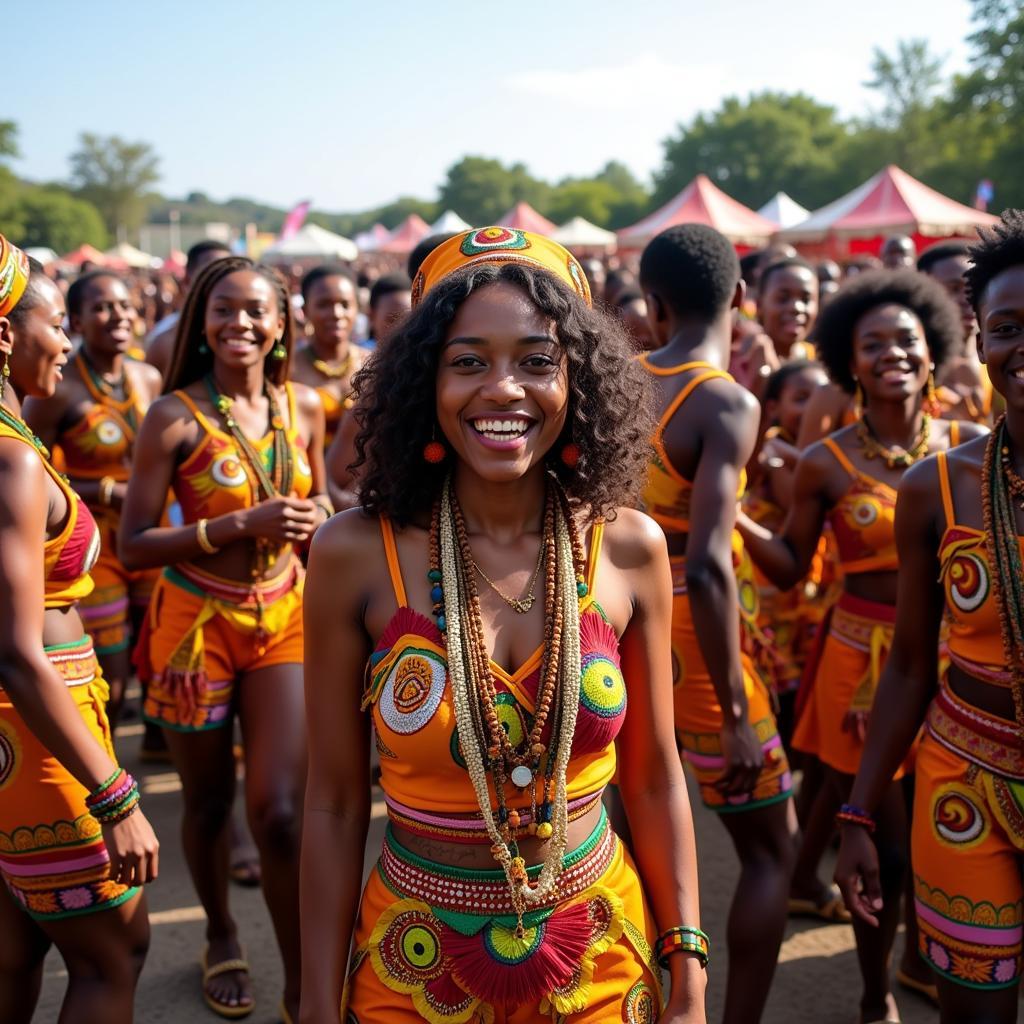Exploring the Rich Tapestry of African Cultural Values
African Cultural Values are the bedrock of societies across the continent, shaping interactions, beliefs, and traditions. These values, diverse and dynamic, reflect the continent’s rich history, varied landscapes, and the ingenuity of its people. This article delves into the core principles that underpin African Life, highlighting their importance and exploring their manifestations in different aspects of society. We’ll journey through the heart of Africa, understanding what makes its cultures so unique and vibrant.
Understanding the Core of African Cultural Values
At the heart of African cultural values lies a deep respect for community, family, and elders. Ubuntu, a Nguni Bantu term, encapsulates this philosophy, emphasizing the interconnectedness of humanity and the importance of collective well-being. This principle promotes social harmony, mutual support, and a strong sense of belonging. Respect for elders is paramount, as they are seen as repositories of wisdom and tradition. Their guidance is sought in decision-making, and their blessings are valued. Family ties are strong, with extended families often living together and supporting each other through thick and thin. Another key value is the emphasis on oral tradition. Stories, proverbs, and songs are passed down through generations, preserving history, teaching moral lessons, and reinforcing cultural identity.
Just after finishing high school, I had the opportunity to visit a rural village in Kenya. The sense of community was palpable. Everyone knew each other, shared meals, and celebrated together. It was a powerful example of Ubuntu in action. You can learn more about related beliefs in this article about African beliefs.
The Role of Spirituality and Ancestral Veneration
Spirituality plays a significant role in shaping African cultural values. A belief in a supreme being and a spiritual realm is widespread, influencing moral codes, rituals, and daily life. Ancestor veneration is also a common practice, reflecting the belief that ancestors continue to influence the living. This practice fosters a connection to the past and provides a sense of continuity and guidance. Rituals and ceremonies are often performed to honor ancestors and seek their blessings.
How Spirituality Influences Daily Life
Spirituality permeates everyday life in many African societies, from greetings to mealtimes. Blessings are sought for important endeavors, and offerings are made to express gratitude or seek favor. Traditional healers and spiritual leaders play vital roles in communities, providing guidance, healing, and spiritual support. This deep connection to the spiritual world influences art, music, and storytelling, enriching cultural expression.
African American cultural values also share some similarities, highlighting the enduring legacy of African traditions. You can delve deeper into this topic by exploring African American cultural values.
African Values in a Changing World
While modernization and globalization have brought about significant changes, many African societies strive to maintain their core cultural values. These values are seen as a source of strength and resilience, providing a foundation for navigating the challenges of the 21st century. There is a growing awareness of the importance of preserving cultural heritage and passing it on to future generations. This has led to initiatives promoting traditional arts, languages, and customs. African cultural values are not static; they evolve and adapt to changing circumstances while retaining their essence.
Navigating Modern Challenges with Traditional Values
African cultural values offer valuable insights into addressing contemporary issues such as conflict resolution, environmental protection, and social justice. The emphasis on community and dialogue can foster peaceful coexistence and promote understanding. The respect for nature inherent in many African traditions can inspire sustainable practices and environmental stewardship. Ubuntu, with its focus on interconnectedness, can provide a framework for building a more just and equitable society.
Dr. Abena Oduro, a renowned Ghanaian sociologist, emphasizes the importance of these values: “African cultural values offer a powerful antidote to the individualism and materialism that often characterize modern society. They remind us of the importance of community, compassion, and respect for all.”
Conclusion
African cultural values represent a rich tapestry of traditions, beliefs, and practices. From the emphasis on community and respect for elders to the deep connection to spirituality and ancestors, these values shape the lives of millions across the continent. Understanding and appreciating these values is crucial for fostering cross-cultural understanding and building a more interconnected world. By embracing the wisdom of African traditions, we can learn valuable lessons about living in harmony with each other and with the planet. As we move forward, let us continue to explore and celebrate the vibrant diversity of African cultural values.
FAQ
-
What is Ubuntu?
Ubuntu is a Nguni Bantu term that emphasizes the interconnectedness of humanity and the importance of collective well-being. -
What role do elders play in African societies?
Elders are highly respected and seen as repositories of wisdom and tradition. Their guidance is sought in decision-making. -
How is spirituality expressed in African cultures?
Spirituality is expressed through belief in a supreme being, ancestor veneration, rituals, and ceremonies. -
How are African cultural values adapting to modern times?
While adapting to change, African societies strive to maintain core values, seeing them as a source of strength and resilience. -
Why are African cultural values important?
They offer valuable insights into addressing contemporary issues like conflict resolution and environmental protection. -
What is the significance of oral tradition in African cultures?
Oral tradition preserves history, teaches moral lessons, and reinforces cultural identity through stories, proverbs, and songs. -
How can I learn more about specific African cultures?
Research online, read books, and engage with cultural organizations to deepen your understanding.
Need More Help?
For further assistance or inquiries about African culture and related topics, please contact us:
Phone: +255768904061
Email: kaka.mag@gmail.com
Address: Mbarali DC Mawindi, Kangaga, Tanzania
Our customer service team is available 24/7 to assist you. You might also be interested in learning about African American Ninja or African Boobs Fingering and Licking. For those curious about African girl kissing prank xvideos you can find information there as well.


